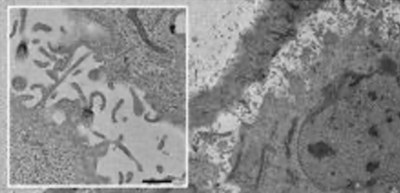
Elucidation of ELF3’s role in cancer progression will promote the development drugs for biliary tract cancer
A group of researchers of Osaka University and the National Cancer Center Japan has clarified that E74-like transcription factor 3 (ELF3) regulates epithelial-mesenchymal transition (EMT*) and tumor immunity, functionsing as a tumor suppressor in biliary tract cancer.
*EMT: a process whereby tightly-interacting and immotile epithelial cells acquire the phenotype of mesenchymal cells and promotes invasion and metastasis in tumors.
In 2016, this group reported on ELF3 with loss-of-function mutations as a novel driver gene in ampullary carcinomas in the scientific journal Cancer Cell and suggested that ELF3 functioned as a suppression gene, but how ELF3 was involved in cancer progression was not clarified.
“Genomic Sequencing Identifies ELF3 as a Driver of Ampullary Carcinoma”
Many Japanese patients with biliary tract cancers (BTC) have ELF3 with loss-of-function mutations. In this study, in order to find ELF3’s role as a tumor suppressor, the researchers investigated genes that ELF3 directly controls their expression and identified proteins involved in cancer metastasis (such as a transcription factor responsible for EMT), proteins related to cell adhesion, and proteins that control immune-related cells. As a result, cell migration and cell adhesion were found to be predominant pathways deregulated by ELF3 depletion.
The researchers found that ELF3 repressed the expression of factors that induce the migration of cytolytic immune cells and that ALOX5 (encoding 5-lipoxygenase) and CXCL16 (encoding C–X–C motif chemokine ligand 16) were downregulated in ELF-deficient cells.
Cancers with ELF3 with loss-of-function mutations and cancers with low Elf3 protein expression are associated with advanced clinical stage and deep tumor invasion.
ALOX5 and CXCL16 were identified as additional direct targets of ELF3; their corresponding proteins 5-lipoxygenase and CXCL16 play a role in the immune response. Thus, 5-lipoxygenase inhibitors and CXCL16/CCR6 blockers could be useful in tumors expressing high levels of ELF3 and be effective against these cancers.
The mechanisms of ELF3-dependent cancer progression clarified by this group will help the development of new drugs of direct target genes of ELF3.
Figure 1
Figure 2
Figure 3
The article, “E74-like factor 3 is a key regulator of epithelial integrity and immune response genes in biliary tract cancer,” was published in Cancer Research at DOI: https://doi.org/10.1158/0008-5472.CAN-19-2988.
Related links
Department of Cancer Genome Informatics, Graduate School of Medicine, Osaka University (link in Japanese)
